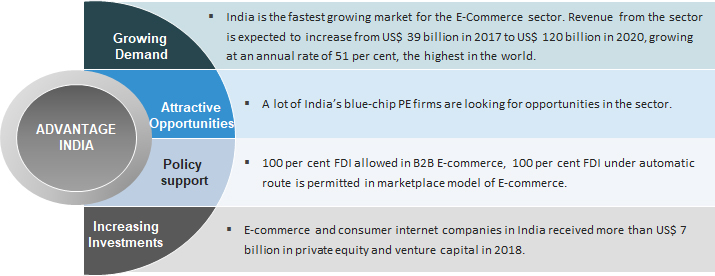Draft E-Commerce Norms- 2019 | 06 Aug 2019
Ministry of Consumer Affairs has released the draft guidelines on e-commerce for consumer protection.
- The e-Commerce guidelines for Consumer Protection, 2019 will be applicable on all business-to-consumer (B2C) e-commerce platforms.
- E-Commerce norms will act as the guiding principles for e-commerce business for preventing fraud, unfair trade practices and protecting the legitimate rights and interests of consumers.
- The key areas that have been covered in the rules include preventing price influencing, addressing counterfeit, improving integrity of reviews as well as increasing transparency of terms e-commerce have with sellers and disclosure of seller information.
Key Guidelines
- Compulsory Return Policy: It is mandatory for e-commerce entities to accept returns in the event the products delivered are defective, wrong or spurious or if they do not have the characteristics or features advertised.
- Seller Details: E-commerce companies will also have to display details about the sellers on their website, especially the type of business furnished by the seller entity.
- Transparent Contract: The draft guidelines propose to increase transparency in contracts signed between e-commerce entities and the sellers, directing them to display terms of their contracts relating to aspects like return, refund, exchange, warranties and guarantees, delivery and shipment, mode of payments and redressing grievances.
- Grievance Redressal: The draft has also sought transparency on the procedure followed to address complaints, directing e-commerce companies to publish contact details of their grievance officers on their websites and setting a one-month timeline for them to redress issues from the time the complaint is registered.
- Fair Pricing Policy: E-commerce platforms will not be allowed to directly or indirectly influence the price of the products and services they offer.
- Unfair Trade Practice: E-commerce platforms cannot adopt any trade practice for the purpose of promoting the sale, use or supply of any goods or services or use unfair and deceptive methods and practices that may influence the consumer’s transactional decisions.
- False Reviews: Guidelines aim to restrict sellers from falsely representing themselves as consumers or posting reviews as well as misrepresenting and exaggerating the quality and features of products on their sites.
Indian E-commerce Market
- According to Morgan Stanley report- 2019, India is adding one Internet user every three seconds.

- The e-commerce sector in India is estimated to reach USD 230 billion by 2028 (accounting for 10% of India’s retail).
- The e-commerce sector in India has been witnessing an explosive growth fuelled by the increase in the number of online users, growing penetration of smartphones and the rising popularity of social media platforms.
- The Indian e-commerce industry is expected to surpass the US to become the second largest e-commerce market in the world by 2034.
- Online shoppers in India are expected to reach 120 million in 2018 and eventually 220 million by 2025.
